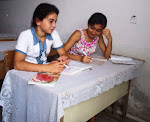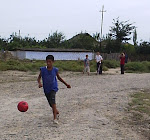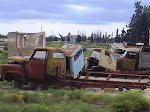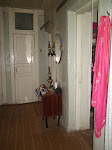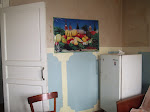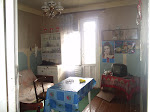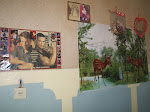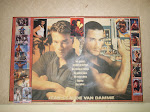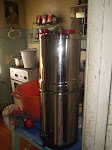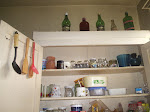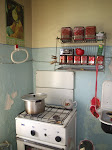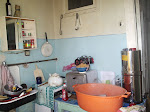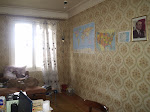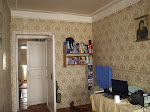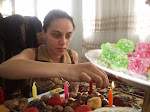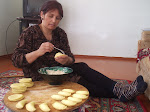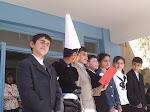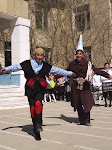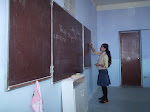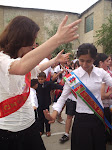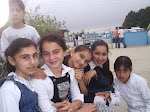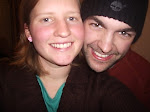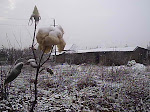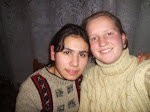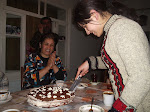6/18
Boredumb
My skin is flushed, my eyes sunk deep. I’m on my bed wondering how long I can critically read Infidel till my eyes tire. Maybe I can make applesauce again or type till my fingers loosely hang from their sockets.
I am so bored. I have never experienced such ennui. Today I spent ten minutes admiring the violet and green floral sheet I bought to match my pillow case. Looks to me more like a plastic table cloth, the patterned ribbon weaves in and out for perfect plate positioning; yet, it lightly layers my body like a good sheet should. Remarkable.
With school I could keep my mind and emotions reeling with student needs, lesson plans, reading about activities, building excitement for never-before-seen methodology, oh! Now, well, now I spend most of the hours in a bright day watching “Grey’s Anatomy.” After I’ve been witness to George, Cali and the rest of Seattle Grace’s romance and letdowns, I think about my own.
Maybe I should spend my time doing development work, you say. Well if there were willing participants than absolutely I would. But most are also worn from the heat and unlike me from a history of civic indifference. So while I’m trying to motivate those people, on the side I am trying to motivate myself to get this room clean, to finish my quilt, to read the novels stocked from the Peace Corps lounge, and finish projects for my newly established art class.
Yes, I have things I can do. I am realizing this as I type. I am also realizing why female volunteers gain an average of 15 pounds before returning to America. I have thought for months that it was what we eat in winter, the breads, the potato, the lack of veges produced in season. But really, really, it is how much we eat once the newness of a place wears off to be substituted with (sometimes boring) action we must create.
6/20
Reconsidering
“Do you speak English? Azerbaijan dili danishirsiz?”
“No, no,” he gleams with teeth reminiscent of the Cultural Revolution’s dentistry work I’ve read about.
“Where are you from?” I try. “Beijing? Shainghai?—“
“Chendu, Chongqing…” He appeases me, as if, like my students do with America, I am boasting the regions I have learned.
“I don’t want anything, no, I don’t want anything.” A construction worker kneeling in the shade of a future cosmetics shop swats the travelers to the opposite side of the road.
“You understand them?” he asks me.
“No, no, they don’t speak English or Azerbaijani, only Chinese.”
On the back of a motorbike in Vietnam my driver pointed to the long road entwined by tropical trees and limestone masses. “That is the Great Highway. The Chinese are building it, from Beijing to Hanoi and into Thailand and Laos.” Henry understood the road’s impending gravity.
As a then-freshman international relations student I was enamored by the capacity of China, considering what I’d seen in SE Asia: Chinese restaurants, fizzy soft drinks, migrant workers, small businesses popping up in some of the world’s poorest rural areas.
Ganja, the second biggest city in country, just opened its first ever Chinese restaurant. At a mere $2-3 a plate it complements a Peace Corps Volunteer’s wallet as well as her taste buds.
Our conversation ends abruptly at a lone-room music shop full of bad American ‘80’s and modern Turkish pop tapes. Dropping amassed straw bags before the clerk they try to pawn off cheap goods to an impoverished population wiser than American consumers. “Don’t buy that, Sasha, it is from China. It is not good product,” my counterpart once cautioned me.
Reported in Newsweek recently was China’s infrastructural and business investment in war torn Africa. The Chinese government, with the help of Westerners and few host country nationals are exerting great effort to reconstruct roads, build hospitals, health clinics and schools, and implement decade-long plans for large-scale trade. Yeah, it’s ambitious.
All the while two tired thirty-somethings towing cheap blow dryers are rejected again. And again and again, I’m sure, because even peasants (as my counterpart calls herself) won’t buy appliances that work a meager year before yielding zero dry heads.
Azerbaijanis look at non-Western, usually darker complexion immigrants as beneath them. Even their own internally displaced peoples are shunned by most communities.
Some Asian-American volunteers have learned to cope, but they are often mistaken for one of these Chinese vendors and are then treated like second-rate citizens. These guys have traveled half the length of the United States to stay god knows where to be turned away from a people suffering traumatic inflation, living on monthly salary that I used to make in a night. Which begs, how much are these guys making?
Curious that they are in my village, too. I saw these same vendors in the town center a few days before. We crossed paths on the main road in front of a new, primary-colored play ground my community insists I build for the local kindergarten. I stared off to their direction, though the gesture wasn’t reciprocated.
I thought to myself, “If I see a foreigner in a country with few ex-pats I’m gonna at least make eye contact with that person, even if they’re from another country.” Acknowledge me, damn it, I wanted to say. I suppose waving to the frazzled white girl might be trivial, considering their load.
6/22
Readjusting
We had debated whether to go to the hot spring, known as isti su, the wildlife reserve where thousands of migratory birds flock, or the Caspian, three kilometers east of my town center.
Jenni, Detroit-grown and full of ambition, had trouble locating the details for the reserve. Ten manat to go, but how much to get in? Double the price for foreigners? Must we speak with officials at the Ministry of Ecology in Baku, as the guidebook stipulates? Is it open on the weekends?
Locals don’t travel, too expensive and no time. So they offered little help with answers that could be found on the net in America.
Since we needed more information on the city’s estranged park reserve, and Jenni hadn’t seen my charming pad, we settled for the sea.
Sitting down to bean burgers with spicy ketchup Jenni laughed, “Oh yeah, did I tell you, someone cemented over isti su.”
Perhaps from the restaurant owner’s vantage the hot spring’s medicinal use was no longer profiting, so he layered the boiling thing in mud and concrete. Understandably, Jenni, I and the author of the aforementioned guidebook are probably the only to ones to have taken interest in it recently.
7 a.m. and hit the alarm. We wanted to make it early to beat the torment of the afternoon sun. I waited another hour to hear my friend stir, and into the kitchen we cooked sunny-side up to serve with day-old soft tendir.
We figured we could take a cab from the town center for a couple manat or walk if taxis were over a few dollars. The walk wouldn’t be far, a mere 20 minutes, my counterpart had assured me.
After 30 minutes of internet time we inquired at the UNICEF-funded computer center. Where can we get a cab to the sea, and do you know how much it will cost?
“I don’t know,” the employee in her short, Jetson skirt replied. “There are taxis on the road by the bazaar you can ask. I have only been to the sea in Baku.” She is always staffed here—I think she works seven days a week. Born into this town but not onto its beach-front, so she’s never seen it.
I should have realized the troubled guesstimation. It came from my counterpart who has been to the town center twice in the past six months, with her husband’s permission. 20 manat the taxi driver said. That’s like $25. There is no road so the car must drive on a bumpy dirt surface, and he must wait since there will be no taxis by the beach this early in season.
I called the other volunteer in my town whose commitment to travel with us was varied, especially after having told him we may walk. Brent is a well-seasoned volunteer. He has been here for two years and spent seven months in Bangladesh before being evacuated prior to its civil war. I asked him how much it would be to the beach from his house, in a settlement not far from the town center. On the map it looks a few kilometers away.
“My host father will take us for 24 manat. It’s just the gas price.”
Up and down we paced the main road, Jenni’s sandals rubbing against her heels. Walking was now out of the question.
“If the three of us go it will only be 8 manat,” Jenni said.
“That’s so much money, though! It just seems ridiculous. It’s three kilometers away!” Rewarding myself for a school year complete, I had spent a large piece of my living allowance for June hanging in Baku. Now I had 40 manat left, a week and a half to my next pay check.
“I’ll lone you the money.”
“And, it’s the Caspian Sea. It’s so polluted. We can’t even go in!”
“Come on, Sasha, I really wanna go. I came all this way.”
“I just don’t get it. It’s so close! Why is it so difficult? Why is everything here so difficult?”
We walked the stretch back to catch the bus to Brent’s host family where we would be brought to a clean, frequented beach.
My host mother caught us from across the narrow road.
“Salam, Sasha!” Quickly I shared our desire for fun which comes with its abhorrent cost.
“For you Sasha, yes, it is too high. I will ask our neighbor but I think you can go for 18 manat.”
With three people that would be 6 manat, a few days’ worth of food, with four people the price would drop to 4.50, the amount I had crossly decided a trip to a polluted beach I would gawk at for an hour is worth.
We walked the same road we had sweated down twice already. Here a wall clears the right side of the road, across from an Islamic paraphernalia shop and a store whose odds and ends are bright red and shimmering pots and pans.
“What’s in there?” Jenni asked about the other side of the wall, as if it was a vacant paradise.
“It’s just a yard, I think. There’s just fruit there.”
“Oh, I’m not interested in that.”
“Sorry I’ve been so negative…You know, in San Francisco you can take the bus to the ocean. Right to the beach!” I threw my hands out like the Pacific Ocean was the murky puddle ahead of us.
“This is not America, Sasha.”
“I know, but really—“
“You just can’t compare the two.”
This was an end-of-term test to be certain that what I have learned recently, that I can’t operate the way I do in America, through research and problem solving, asking questions and understanding legitimate replies is true.
In the room where my quilt lays unfinished, Jenni and I discussed the day before a Peace Corps Volunteer’s enlightened one-year assurance: It’s just how it is.
In 27 months of living, eating, loving, speaking Azerbaijani, I will never be able to understand the secular Islamic, post-Soviet way of life. Why not have a clean beach? Why not make it easily accessible? Why don’t any of the locals know how to get there?
I maintain an open mind, is how I cope. I walk down the road several times over, it bends, I adjust, I readjust. I get used to it, folk.
We stopped for ice cream in front of an automotive shop with a freezer. Like birds on worms we pulled out two creamy Snickers bars from the bottom of the stock. In summer, nearly every shop, clothing, automotive, sells ice cream. That’s a difference I can deal with.
6/23
Yusif is a tall, fragile man. His hair line creeps to the middle of his head where grey strings assemble and loosely hang to his ears. His teeth look like tiny flanks of driftwood, and for some reason he hasn’t embedded half the golden caps that most Azerbaijanis do. In the U.S. I would guess him to be 70, but he’s probably closer to his mid-fifties.
I like Yusif not just because he’s painter, a rare occupation even in America. Yusif is understanding and patient. Unlike neighbors and shop owners, he waits for me to sort grammar and vocabulary to produce an intelligible sentence in Azerbaijani.
I called Yusif as I must for a refill on my water tank. Rightfully so, he doesn’t trust me to call the water guy myself. Confusion would abound about my presence here, not because people think I’m a spy but because they can’t understand how I can be here alone, how my father could allow me to travel this far from home. To save moments of confusion to emotional resolution, water may be delayed.
Yusif didn’t show the day I asked. This is normal. Azerbaijani-time is months to our minutes. Still, the American that I am I can’t help but be irritated when he says Yes, I’ll come, but shows a day or two after.
A volunteer shared that her mother had been ringing her when before going out she had accidentally left her cell on the dining room table. Like most Azerbaijani landlords, hers was perusing her apartment, searching through personal items, or whatever landlords do when they break and enter homes.
On her mother’s third attempt, her landlord picked up the phone. “Alo?”
“Alo?! Who is this?! Where’s Rachel?!” her mom demanded.
When Rachel eventually got the call, she assured her mother that it’s normal, privacy here is a farce and she’s adjusted to the constant company of Azerbaijanis.
Like most Azerbaijani landlords Yusif comes and goes like it’s a road he must traverse from work. When I first moved in Yusif visited to assure I was surviving alone, had enough food, knew how to cook and clean, and that I was not starting any wild California-girl parties in his apartment.
Now he comes once a week, pretending to gather art supplies from the large closet connected to my guest room. It is here he keeps thin orange and brown brushes, dried paint and stacks of oil portraits with no home in which to be hung in. Two of the most poignant are of Lenin and Gorbachev, the one who brought democracy to the East stacked on top of the communist organizer. Recently, on the guest bed, Yusif laid communist calendar posters, propagating workers’ fantastical lives. With black ink he began to demonstrate remodeling the toilet room on these sheets, when I shouted, “Don’t write on that!”
He laughed, unable to understand the allure of these pictures. In 2008 he has every right to scribble all over them.
The day after I called he comes to casually collect few of his brushes for a project in the town center. He gazes at his brushes like they are his true love, not the arranged marriage his community sees him in. “Beautiful,” he says.
I confidently walk into the closet where Yusif stands admiring an old landscape. “Yusif, I need water.”
As if it will fall from the sky into my tank, “Yes, Sasha, it will come,” he says.
“When, Yusif?”
“At one o’clock.”
At one o’clock, when the tap is dripping just enough to wash my hands, he pulls in a white extension cord he attaches to a pump which coerces water from my neighbor’s tank to mine. My neighbor knows about this yet I’m still uneasy, partially because I don’t understand where my $6 to the fill the tank is going. I ask Yusif when the water truck comes.
“It comes when you need it.”
“Yes, Yusif I need it now. You are taking water from my neighbor’s tank. Why?”
“Because the water car came on Saturday. Were you here?”
“Yes, but I didn’t need water then.”
“Well, it came.”
“But when will it come again?”
“When someone needs water.”
But I need water, I think.
Defeated, I walk to my overheated room and continue Teaching to Transgress, unable to be sure to whom the book relates.
There is a one-inch hole near the top of the rusted water tank. When this begins spewing water we know the tank has reached its limit. From my window I watch Yusif run like Gumby to turn off the valve. While he’s there I turn the nozzle to fill one bucket with orange sediment and water. This is normal, at least for the first two buckets. I heat it to wash my dishes anyway, in hopes I can scrape out the fluorescent residue when it floats to the top.
“Sasha, is there water?” asks Yusif.
“Yes, there’s water but it’s not a lot.” This happens too: the faucet accumulates the metal deposits which aren’t pressured into my drinking water.
Yusif takes his multi-purpose hammer from the collection of trinkets in his room. He beats the tap a series of times, and the residual pieces should be pushed out with delayed water. This time, the tap pops off.
“Now there’s a lot of water, Yusif.” Like a dam burst, water floods from the 50-year-old pipeline.
He wobbles down stairs, cranking the main water valve to a stopping point. At least seven gallons of water, like five loads of dishes, catch in my big plastic container used for laundry. Good thing, since the tub leaks to the downstairs neighbor’s.
Yusif returns and explains that he needs tools to fix this “small problem.”
Four hours later with a handkerchief, a foot-long screw driver and medical tape he secures the tap into what I see now is an oversized pipe. But again, I have water in my home, and that’s more than I had imagined when I signed up for the Peace Corps.
6/27/2008 ONE YEAR IN AZERBAIJAN
Friday, July 11, 2008
Subscribe to:
Posts (Atom)

